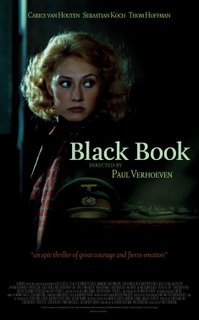TIFF 2006; "BLACK BOOK"
 (Gala Presentation)
(Gala Presentation)
(The Netherlands/Germany/United Kingdom/Belgium, 2006, 135 minutes)
Written by Paul Verhoeven and Gerard Soeteman
Directed by: Paul Verhoeven
Cast: Carice van Houten, Sebastian Koch, Thom Hoffman, Halina Reijn, Derek de Lint
Paul Verhoeven's first Dutch feature since 1983's "The Fourth Man" shows that twenty-plus years of dodging shrapnel in the Hollywood trenches has taught him a thing or two about spinning a crackerjack yarn and put every dollar up on the screen (we'll forgive him if some of those dollars were slipped into the waistband of Elizabeth Berkley) while still sneaking in a subversive observation or two.
While allegedly inspired by "true" events, “Zwartboek” (“Black Book”) is a wholly fictional WW caper which focuses on a young Jewish woman who joins the Resistance to avenge her family's murder, only to fall in love with one of the enemy and ultimately suffer shame and ostracization from her own people. Verhoeven's works are always a bit tough to classify (which is what makes most of them so rewarding) and "Black Book" is certainly no exception, esp. considering the combustible subject matter. This one falls somewhere between Verhoeven's gritty and deliberately-paced European dramas like the scattershot "Turkish Delight" and the meditative WW2 set "Soldier Of Orange", and his splashy, two-fisted American sci-fi blockbusters like "Robocop" and "Starship Troopers"--thankfully, like the latter productions, this one has as much fun poking holes at genre expectations as it does wallowing in the sheer gee-whiz power of pure moviemaking (at $22M, it’s the most expensive Dutch-language film ever made).
We being on a kibbutz in Israel in 1956, less than a decade into its formation, where a school teacher "Rachel Rosenthal" (newcomer Carice van Houten, a real discovery) is recognized by a tourist who turns out to be her former friend Ronnie (Reijn), whom she knew in Holland during the war. Flashing back to 1944, we find Rachel (then "Stein") hiding out in the Dutch countryside with a Christian family, whose strict patriarch doesn't care for her religious beliefs but kindly offers his sanctuary all the same. A resistance worker, Van Gein, has been working on Rachel’s behalf to reunite her with her family so that they can all flee to the liberated south. But the escape down the Biesbosch is thwarted by an SS ambush, and almost everyone is massacred. Save for Rachel, whose resilience and luck take her to a job at a food processing plant, from which a resistance cell operates.
Their socialist leader Kuipers (de Lint) eventually drafts her into undercover missions that will rely as much on her feminine wiles as they will her brains and hunger for revenge. Assuming the alias Ellies de Vries, Rachel dies her hair blond and is sent into the belly of the Nazi beast to free three captured members of her group by seducing Gestapo bigwig Ludwig Müntze (Koch) with her singing voice initially, then her body (her co-conspirator and fellow agent, Ronnie, gamely enchants Müntze’s oafish right-hand Franken). She plants a microphone in Müntze’s office, from which the resistance agents can listen in on important strategic meetings. But Müntze eventually sees through Rachel’s disguise, and she admits she’s Jewish. But they’ve fallen madly in love for each other, and Muentze risks his career—and his life—to keep her safe. A rare man of humanity and sensitivity within the Third Reich, Müntze seeks to arrange a ceasefire with the resistance, despite a direct order from the Fuehrer himself.
As the war comes to a close, Rachel’s chances for revenge grow increasingly remote, as the Nazis lose power and her lover finds himself suddenly redundant, disenfranchised, and endangered. Rachel’s loyalties are questioned by her own people, who now find themselves the weilders of power and whose fury is unleashed on their prisoners in brutal degradations.
It must sound awfully dense, and while Verhoeven and co-writer Soeteman (a frequent collaborator) expect you to keep up--unlike most wartime dramas, there’s no actual vintage footage used nor narration provided for context or clarity--it all goes down as easy as a beach read, in fact, it’s hard to believe this hasn’t been based on a page-turner by someone like Robert Harris or John Altman. The idea of a “kindly” Nazi will likely upset anyone who’s still steaming over “Hogan’s Heroes”, and while I’ll admit that no one will ever mistake “Black Book” for “Salo” or even “Schindler’s List”, its often far-reaching melodrama plays out with as much bravado as brains within a complex moral gray area that may not be “The Grey Zone”, but heady stuff for what some have all to glibly dismissed as the second coming of “Shining Through”.
Verhoeven was disappointingly curt in his post-screening Q&A (Audience member: “Why did you make this film?” Verhoeven: “Why’d you come to see it?”) and offered little insight beyond that he spent several decades conceiving the script and that financing took several years to secure, and that the “darker aspects” of the Dutch national character depicted were based upon his own first-hand experiences (considering he was all of six when the events of “Black Book” took place, I would’ve liked to have heard more). Not that it matters—everything we need to know about Verhoeven is up on the screen (he’s become the living incarnation of Eli Cross, Peter O’Toole’s character from “The Stunt Man”), and while this one may skirt more “prestigious” avenues than his oft-misunderstood genre blockbusters ((it’s already being primed as the Netherlands’ official entry into next year’s Academy Awards), it’s just as fiercely indicting—and perversely celebratory--of humanity in all of its fleshy, gluttonous, metastizing hypocrisy.



